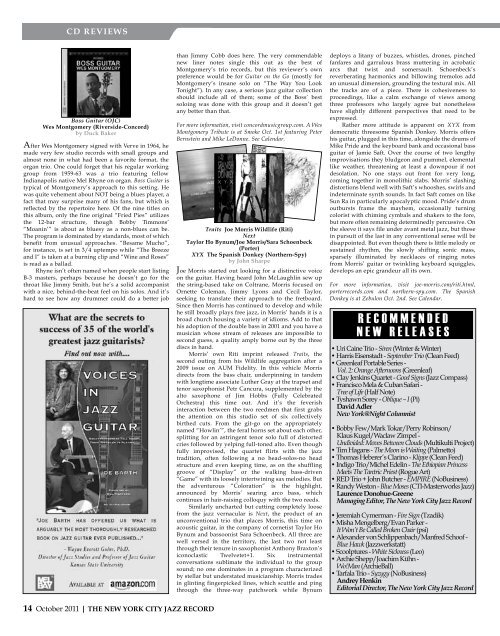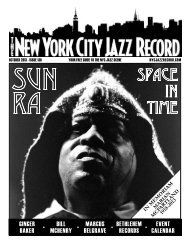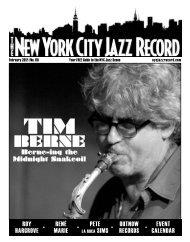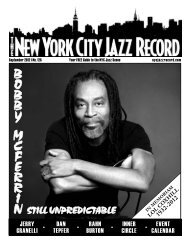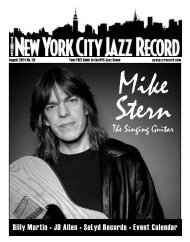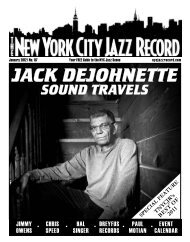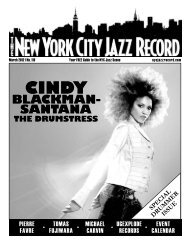Return of the Guitar Man - The New York City Jazz Record
Return of the Guitar Man - The New York City Jazz Record
Return of the Guitar Man - The New York City Jazz Record
You also want an ePaper? Increase the reach of your titles
YUMPU automatically turns print PDFs into web optimized ePapers that Google loves.
CD REVIEWS<br />
Boss <strong>Guitar</strong> (OJC)<br />
Wes Montgomery (Riverside-Concord)<br />
by Duck Baker<br />
After Wes Montgomery signed with Verve in 1964, he<br />
made very few studio records with small groups and<br />
almost none in what had been a favorite format, <strong>the</strong><br />
organ trio. One could forget that his regular working<br />
group from 1959-63 was a trio featuring fellow<br />
Indianapolis native Mel Rhyne on organ. Boss <strong>Guitar</strong> is<br />
typical <strong>of</strong> Montgomery’s approach to this setting. He<br />
was quite vehement about NOT being a blues player, a<br />
fact that may surprise many <strong>of</strong> his fans, but which is<br />
reflected by <strong>the</strong> repertoire here. Of <strong>the</strong> nine titles on<br />
this album, only <strong>the</strong> fine original “Fried Pies” utilizes<br />
<strong>the</strong> 12-bar structure, though Bobby Timmons’<br />
“Moanin’” is about as bluesy as a non-blues can be.<br />
<strong>The</strong> program is dominated by standards, most <strong>of</strong> which<br />
benefit from unusual approaches. “Besame Mucho”,<br />
for instance, is set in 3/4 uptempo while “<strong>The</strong> Breeze<br />
and I” is taken at a burning clip and “Wine and Roses”<br />
is read as a ballad.<br />
Rhyne isn’t <strong>of</strong>ten named when people start listing<br />
B-3 masters, perhaps because he doesn’t go for <strong>the</strong><br />
throat like Jimmy Smith, but he’s a solid accompanist<br />
with a nice, behind-<strong>the</strong>-beat feel on his solos. And it’s<br />
hard to see how any drummer could do a better job<br />
14 October 2011 | THE NEW YORK CITY JAZZ RECORD<br />
than Jimmy Cobb does here. <strong>The</strong> very commendable<br />
new liner notes single this out as <strong>the</strong> best <strong>of</strong><br />
Montgomery’s trio records, but this reviewer’s own<br />
preference would be for <strong>Guitar</strong> on <strong>the</strong> Go (mostly for<br />
Montgomery’s insane solo on “<strong>The</strong> Way You Look<br />
Tonight”). In any case, a serious jazz guitar collection<br />
should include all <strong>of</strong> <strong>the</strong>m; some <strong>of</strong> <strong>the</strong> Boss’ best<br />
soloing was done with this group and it doesn’t get<br />
any better than that.<br />
For more information, visit concordmusicgroup.com. A Wes<br />
Montgomery Tribute is at Smoke Oct. 1st featuring Peter<br />
Bernstein and Mike LeDonne. See Calendar.<br />
Traits Joe Morris Wildlife (Riti)<br />
Next<br />
Taylor Ho Bynum/Joe Morris/Sara Schoenbeck<br />
(Porter)<br />
XYX <strong>The</strong> Spanish Donkey (Nor<strong>the</strong>rn-Spy)<br />
by John Sharpe<br />
Joe Morris started out looking for a distinctive voice<br />
on <strong>the</strong> guitar. Having heard John McLaughlin sew up<br />
<strong>the</strong> string-based take on Coltrane, Morris focused on<br />
Ornette Coleman, Jimmy Lyons and Cecil Taylor,<br />
seeking to translate <strong>the</strong>ir approach to <strong>the</strong> fretboard.<br />
Since <strong>the</strong>n Morris has continued to develop and while<br />
he still broadly plays free jazz, in Morris’ hands it is a<br />
broad church housing a variety <strong>of</strong> idioms. Add to that<br />
his adoption <strong>of</strong> <strong>the</strong> double bass in 2001 and you have a<br />
musician whose stream <strong>of</strong> releases are impossible to<br />
second guess, a quality amply borne out by <strong>the</strong> three<br />
discs in hand.<br />
Morris’ own Riti imprint released Traits, <strong>the</strong><br />
second outing from his Wildlife aggregation after a<br />
2009 issue on AUM Fidelity. In this vehicle Morris<br />
directs from <strong>the</strong> bass chair, underpinning in tandem<br />
with longtime associate Lu<strong>the</strong>r Gray at <strong>the</strong> trapset and<br />
tenor saxophonist Petr Cancura, supplemented by <strong>the</strong><br />
alto saxophone <strong>of</strong> Jim Hobbs (Fully Celebrated<br />
Orchestra) this time out. And it’s <strong>the</strong> feverish<br />
interaction between <strong>the</strong> two reedmen that first grabs<br />
<strong>the</strong> attention on this studio set <strong>of</strong> six collectively<br />
bir<strong>the</strong>d cuts. From <strong>the</strong> git-go on <strong>the</strong> appropriately<br />
named “Howlin’”, <strong>the</strong> feral horns set about each o<strong>the</strong>r,<br />
splitting for an astringent tenor solo full <strong>of</strong> distorted<br />
cries followed by yelping full-toned alto. Even though<br />
fully improvised, <strong>the</strong> quartet flirts with <strong>the</strong> jazz<br />
tradition, <strong>of</strong>ten following a no head-solos-no head<br />
structure and even keeping time, as on <strong>the</strong> shuffling<br />
groove <strong>of</strong> “Display” or <strong>the</strong> walking bass-driven<br />
“Game” with its loosely intertwining sax melodies. But<br />
<strong>the</strong> adventurous “Coloration” is <strong>the</strong> highlight,<br />
announced by Morris’ searing arco bass, which<br />
continues in hair-raising colloquy with <strong>the</strong> two reeds.<br />
Similarly uncharted but cutting completely loose<br />
from <strong>the</strong> jazz vernacular is Next, <strong>the</strong> product <strong>of</strong> an<br />
unconventional trio that places Morris, this time on<br />
acoustic guitar, in <strong>the</strong> company <strong>of</strong> cornetist Taylor Ho<br />
Bynum and bassoonist Sara Schoenbeck. All three are<br />
well versed in <strong>the</strong> territory, <strong>the</strong> last two not least<br />
through <strong>the</strong>ir tenure in saxophonist Anthony Braxton’s<br />
iconoclastic Twelvetet+1. Six instrumental<br />
conversations sublimate <strong>the</strong> individual to <strong>the</strong> group<br />
sound; no one dominates in a program characterized<br />
by stellar but understated musicianship. Morris trades<br />
in glinting fingerpicked lines, which scuttle and ping<br />
through <strong>the</strong> three-way patchwork while Bynum<br />
deploys a litany <strong>of</strong> buzzes, whistles, drones, pinched<br />
fanfares and garrulous brass muttering in acrobatic<br />
arcs that twist and somersault. Schoenbeck’s<br />
reverberating harmonics and billowing tremolos add<br />
an unusual dimension, grounding <strong>the</strong> textural mix. All<br />
<strong>the</strong> tracks are <strong>of</strong> a piece. <strong>The</strong>re is cohesiveness to<br />
proceedings, like a calm exchange <strong>of</strong> views among<br />
three pr<strong>of</strong>essors who largely agree but none<strong>the</strong>less<br />
have slightly different perspectives that need to be<br />
expressed.<br />
Ra<strong>the</strong>r more attitude is apparent on XYX from<br />
democratic threesome Spanish Donkey. Morris <strong>of</strong>fers<br />
his guitar, plugged in this time, alongside <strong>the</strong> drums <strong>of</strong><br />
Mike Pride and <strong>the</strong> keyboard bank and occasional bass<br />
guitar <strong>of</strong> Jamie Saft. Over <strong>the</strong> course <strong>of</strong> two lengthy<br />
improvisations <strong>the</strong>y bludgeon and pummel, elemental<br />
like wea<strong>the</strong>r, threatening at least a downpour if not<br />
desolation. No one stays out front for very long,<br />
coming toge<strong>the</strong>r in monolithic slabs. Morris’ slashing<br />
distortions blend well with Saft’s whooshes, swirls and<br />
indeterminate synth sounds. In fact Saft comes on like<br />
Sun Ra in particularly apocalyptic mood. Pride’s drum<br />
outbursts frame <strong>the</strong> mayhem, occasionally turning<br />
colorist with chiming cymbals and shakers to <strong>the</strong> fore,<br />
but more <strong>of</strong>ten remaining determinedly percussive. On<br />
<strong>the</strong> sleeve it says file under avant metal jazz, but those<br />
in pursuit <strong>of</strong> <strong>the</strong> last in any conventional sense will be<br />
disappointed. But even though <strong>the</strong>re is little melody or<br />
sustained rhythm, <strong>the</strong> slowly shifting sonic mass,<br />
sparsely illuminated by necklaces <strong>of</strong> ringing notes<br />
from Morris’ guitar or twinkling keyboard squiggles,<br />
develops an epic grandeur all its own.<br />
For more information, visit joe-morris.com/riti.html,<br />
porterrecords.com and nor<strong>the</strong>rn-spy.com. <strong>The</strong> Spanish<br />
Donkey is at Zebulon Oct. 2nd. See Calendar.<br />
RECOMMENDED<br />
NEW RELEASES<br />
• Uri Caine Trio - Siren (Winter & Winter)<br />
• Harris Eisenstadt - September Trio (Clean Feed)<br />
• Greenleaf Portable Series -<br />
Vol. 2: Orange Afternoons (Greenleaf)<br />
• Clay Jenkins Quartet - Good Signs (<strong>Jazz</strong> Compass)<br />
• Francisco Mela & Cuban Safari -<br />
Tree <strong>of</strong> Life (Half Note)<br />
• Tyshawn Sorey - Oblique – I (Pi)<br />
David Adler<br />
<strong>New</strong> <strong>York</strong>@Night Columnist<br />
• Bobby Few/Mark Tokar/Perry Robinson/<br />
Klaus Kugel/Waclaw Zimpel -<br />
Undivided: Moves Between Clouds (Multikulti Project)<br />
• Tim Hagans - <strong>The</strong> Moon is Waiting (Palmetto)<br />
• Thomas Heberer’s Clarino - Klippe (Clean Feed)<br />
• Indigo Trio/Michel Edelin - <strong>The</strong> Ethiopian Princess<br />
Meets <strong>The</strong> Tantric Priest (Rogue Art)<br />
• RED Trio + John Butcher - EMPIRE (NoBusiness)<br />
• Randy Weston - Blue Moses (CTI-Masterworks <strong>Jazz</strong>)<br />
Laurence Donohue-Greene<br />
<strong>Man</strong>aging Editor, <strong>The</strong> <strong>New</strong> <strong>York</strong> <strong>City</strong> <strong>Jazz</strong> <strong>Record</strong><br />
• Jeremiah Cymerman - Fire Sign (Tzadik)<br />
• Misha Mengelberg/Evan Parker -<br />
It Won’t Be Called Broken Chair (psi)<br />
• Alexander von Schlippenbach/<strong>Man</strong>fred Scho<strong>of</strong> -<br />
Blue Hawk (<strong>Jazz</strong>werkstatt)<br />
• Scoolptures - White Sickness (Leo)<br />
• Archie Shepp/Joachim Kühn -<br />
Wo!<strong>Man</strong> (ArchieBall)<br />
• Tarfala Trio - Syzygy (NoBusiness)<br />
Andrey Henkin<br />
Editorial Director, <strong>The</strong> <strong>New</strong> <strong>York</strong> <strong>City</strong> <strong>Jazz</strong> <strong>Record</strong>


